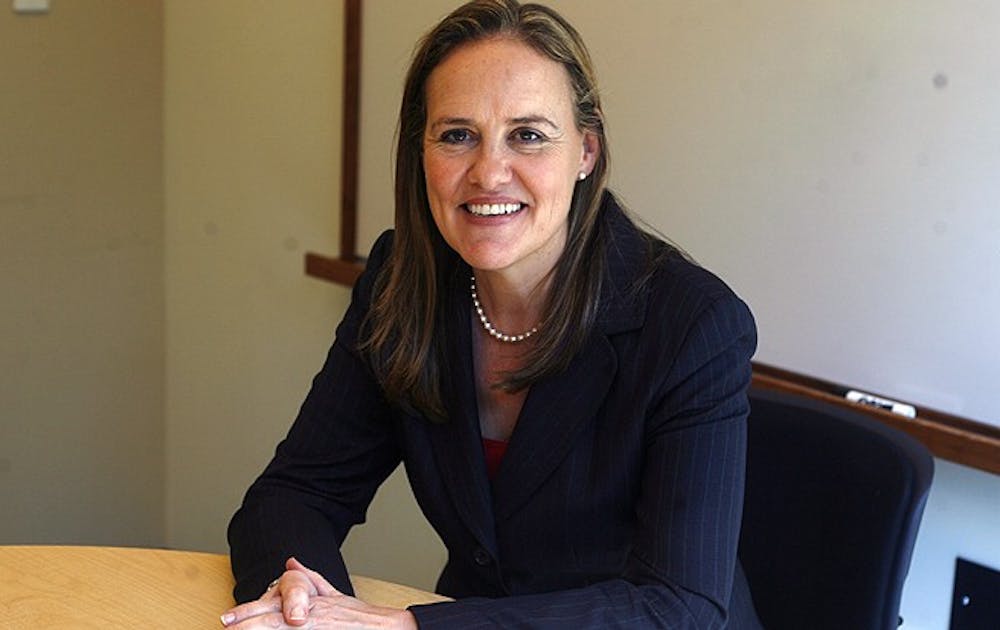The Pentagon’s Michele Flournoy encouraged students to try to “see how government really works” in her discussion on “American Grand Strategy in a Time of Fiscal Constraint” Thursday evening.
Flournoy, the former undersecretary of defense for policy under President Barack Obama, spoke before a full audience at the Sanford School of Public Policy with political science professor Peter Feaver as a visiting fellow of the Von der Heyden Fellows Program. The discussion covered topics ranging from decision processes behind military action in Afghanistan to dealing with budget constraints while maintaining a global military presence as Flournoy shared her experiences in creating policies on each issue.
As the undersecretary, Flournoy helped establish policy on issues including the wars in Afghanistan and Iraq, the America’s intervention in Libya and the government’s response to the Arab Spring conflict. She now serves as a foreign policy adviser in Obama’s re-election campaign.
Feaver began the conversation by discussing the failures and successes of previous defense secretaries, specifically focusing on the transition between Donald Rumsfeld and Robert Gates. Flournoy explained that Gates’ leadership style in the Pentagon was significantly different from that of his predecessor.
Whereas Rumsfeld brought a very close group to work with him at the Pentagon, which isolated him from other staff members, Gates entered “essentially on his own,” Flourney said. This allowed him to be more involved in different departments and foster a good work ethic.
“He treated the military relationships not just as his stakeholders but as his partners in making the tough calls and doing the right thing,” Flournoy said. “That filters down. When people see the top relationships as collegial, professional, productive, respectful, that all filters down in terms of how people deal with each other.”
Through a series of questions, Feaver grilled Flournoy on the different areas of friction between the president and various officials when making strategic decisions about actions in Afghanistan. He specifically referenced a portion of Bob Woodward’s 2010 book, “Obama’s Wars,” closely following the approval of the Afghan surge in which the members of the defense department were warned that the president would have a “Whiskey Tango Foxtrot” moment if he were to be asked by defense officials to authorize the deployment of even more troops.
In the face of the impending Afghan elections and security reports from ground operations, the president authorized the movement of troops, Flourney said, though she noted that at no point was there pressure against deploying troops.
“One of the things you have to learn is don’t believe everything you read in Bob Woodward books…” Flournoy said. “But having been one of the co-chairs that knew, I will tell you there was no predetermination, and I never felt any pressure in terms of ‘do not come and ask for more troops.’”
Feaver continued to stress the controversies surrounding the Afghan surge, criticizing the timing of the military’s announcement of its plan.
Flourney defended the decision to announce the surge with a timeline, explaining that it sought to communicate that the increased troop activity was not a permanent commitment. She added that the plan also sought to prevent Afghan cultural dependency.
“‘We’re not here to occupy and rule you, we are here to help you secure your territory, and we will leave it in your hands with continued support.’ That was the message that was attempted,” she said.
Feaver turned the conversation to the current policy developing around “strategically balancing” the declining military presence in the Middle East and plans to increase military occupation in Asia Pacific. Flournoy explained that as available military resources are expected to increase, Southeast Asia is the most logical place to position them.
“As we envision the transition out of Afghanistan and the end of more than a decade of war, we have some choices with available bandwidth and with available resources,” she said. “Where do we want to place our bets?”
Despite these plans, should the president be re-elected, his first priority will be to establish a new budget deal, Flournoy said. Once a balanced budget is determined, the Pentagon will have a better understanding of the policies that need to be made.
“His number one priority is putting that in place so we have the predictability to unleash and unlock the private sector investment that we really need to get the economy moving,” she said. “That is what will clarify the parameters for defense.”
Flournoy has been active in defense policy throughout her career. She served as the principle deputy assistant secretary for strategy under the Clinton administration, after which she left and co-founded a research think tank titled the Center for New American Security. She re-entered the Pentagon as the undersecretary of defense policy in 2009 as part of Obama’s transition team, where she remained until February 2012.
Flournoy left her post as undersecretary in February to join Obama’s campaign. When asked to name one of GOP opponent Mitt Romney’s most fair criticisms of the defense strategies under Obama, she said she could not name one.
After the discussion, Feaver said he was pleased with how it went, given that Flournoy had been “high on his wish list” of fellows to invite to Sanford for a long time. The most important part of her message was explaining the plans for military placement in the future, given the budget cuts.
“There’s still a feeling that the world is a dangerous place, and that a world with a weak American military presence is more dangerous,” he said.
Get The Chronicle straight to your inbox
Signup for our weekly newsletter. Cancel at any time.

